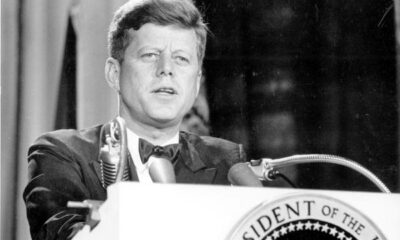Civilization
Foreign Policy Starts in Your Own Neighborhood

As Secretary of State George Shultz observed, “foreign policy starts in your own neighborhood.” For Shultz, and for the president whom he served, the United States could not successfully confront the Soviet Union without strengthening relationships, shoring up alliances, and addressing problems in the Western Hemisphere. Unfortunately, in recent years, the United States has not paid sufficient attention to its backyard, forgetting this key lesson of statecraft. The oversight is puzzling, given that the United States seeks to win a great-power competition with China. In an era of uncertainty, American policymakers should abide by Shultz’s diplomatic maxim.
Foreign policy example #1: Ronald Reagan
Ronald Reagan faced a world in crisis upon walking into the Oval Office. Around the globe, interstate conflicts, civil wars, terrorism, and nuclear weapons were the crises du jour. The Cold War was bound for escalation. A resurgent Soviet Union built up a powerful military, bulldozed into Afghanistan, propelled revolutionary movements in the developing world, and resealed the Iron Curtain. In the Western Hemisphere, where the struggle for democracy persisted, revolution and counterrevolution plunged the region into a maelstrom of instability.
Reagan prioritized Latin America and the Caribbean in his foreign policy from the get-go. On January 28, 1981, Reagan hosted the Jamaican Prime Minister Edward Seaga as his first head of state guest at the White House. At his first presidential press conference the next day, he discussed having a proactive policy for the Caribbean. In the succeeding weeks, he focused his first four National Security Council meetings on crises besetting Central America and the Caribbean.
The neighborhood policy: Latin America
When Shultz became secretary of state in 1982, he set about executing the neighborhood policy in a similar fashion. Shultz dedicated his first two foreign trips to Canada and Mexico, where Reagan joined him to meet with President-elect Miguel de la Madrid. Several weeks afterward, Shultz and Reagan visited Brazil, Colombia, Costa Rica, and Honduras, during which they engaged in what Shultz termed “gardening”: the consistent practice of cultivating and maintaining relationships, especially by meeting leaders on their home turf. Their efforts were part and parcel of building trust, which Shultz rightly called “the coin of realm.”
By the end of Reagan’s presidency, the Western Hemisphere had undergone a remarkable transformation. Relying on Shultz’s skillful diplomacy, Reagan promoted political and economic freedom in the region, thereby curtailing Soviet influence and encouraging transitions to civilian rule in Argentina, Brazil, Chile, and Uruguay. Reagan also launched the Caribbean Basin Initiative and with Shultz laid the groundwork for the North American Free Trade Agreement. Reagan’s diplomatic, economic, and security initiatives, however, invited some controversy. The “democratic revolution” was not without bloodshed. Reagan’s steadfast support for an anti-communist insurgency in Nicaragua not only pressured the Sandinistas into democratic reforms, but it also embroiled his administration in the Iran-Contra affair.
Lessons to learn
Still, American policymakers can learn from Reagan and Shultz’s neighborhood policy. Perhaps not involved in a cold war, but rather a great-power rivalry over the international order, the United States now confronts an intensifying conflict with China and its authoritarian partners Russia, Iran, and North Korea. Although the ideological, technological, economic, and military dimensions differ from the superpower conflict of the Reagan era, the neighborhood element of Reagan’s Cold War strategy holds true for today. The United States can emerge victorious, and it must reorient hemispheric relations to do so.
Currently, the Western Hemisphere presents challenges for American policymakers. The despotic quartet of China, Russia, Iran, and North Korea have increased their influence in the region, much to its detriment. Cuba, Nicaragua, and Venezuela remain dedicated adversaries of the United States. Transnational criminal organizations run rampant, destabilizing governments, fomenting violence, and exacerbating the migration crisis that concerns the American public. Financial and environmental issues threaten many countries, too. Despite these dilemmas, however, favorable economic and political headwinds give the region reasons for an optimistic outlook, not one of an inexorable decline into another “Lost Decade.”
Effectively engaging the Western Hemisphere only requires common sense and volition on the part of American policymakers. Easier said than done, of course, but a comprehensive approach to the region is feasible. The United States indeed possesses the resources and tools to pursue security cooperation, economic development, and cultural and educational exchanges while supporting democracy and healthy political institutions.
Foreign policy solutions for the Western Hemisphere
Democratic and Republican members of Congress, for their part, acknowledge the problems and offer concrete solutions. The Senate has tackled hemispheric security. Senators James Risch (R-ID), Tim Kane (D-VA), and Marco Rubio (R-FL) introduced the Western Hemisphere Partnership Act, Caribbean Basin Security Initiative Authorization Act, and the Western Hemisphere Security Strategy Act, respectively. These bills have easily garnered bipartisan support. So, too, has the Americas Trade and Investment Act, which creates a process for integrating the hemisphere through “regional trade, investment, and people-to-people partnership.” Senators Bill Cassidy (R-LA) and Michael Bennet (D-CO) as well as Representatives Adriano Espalillat (D-NY) and Maria Elvira Salazar (R-FL) are championing this forward-thinking legislation.
President Joe Biden has recognized the significance of hemispheric relations but offered half-measures. “No region impacts the United States more directly than the Western Hemisphere,” contends his National Security Strategy. Yet Europe and Asia fill his schedule. To be sure, his Secretary of State Antony Blinken has visited ten countries in Latin America and the Caribbean, beginning his foreign travels with a “virtual visit” to Canada and Mexico in February 2021. The United States also hosted the 2022 Summit of Americas in Los Angeles, which achieved mixed results, and Biden developed the Americas Partnership for Economic Prosperity, an initiative aiming to spur integration that has yet to bear substantial binding agreements.
Summary
In January 2023, Biden finally journeyed to Latin America, traveling to Mexico for the North American Leaders’ Summit. In November 2024, he will attend the G20 summit hosted in Brazil, where the president has a prime opportunity to make great strides toward furthering hemispheric relations while in the area. The fate of the international order could depend on it.
Ensuring stability, stimulating development, and fostering friendly relations in the Western Hemisphere is fundamental to the national security, economy, and global standing of the United States. Alliances, partnerships, and friends are crucial for waging a great-power competition—but even more so when they reside in your neighborhood. Shultz’s wisdom serves as a reminder that the United States must greet the neighbors and tend the garden.
This article was originally published by RealClearDefense and made available via RealClearWire.
Joseph A. Ledford is a Hoover Fellow at the Hoover Institution at Stanford University.
-

 Civilization1 day ago
Civilization1 day agoWhy Europe Shouldn’t Be Upset at Trump’s Venezuelan Actions
-

 Accountability4 days ago
Accountability4 days agoWaste of the Day: Principal Bought Lobster with School Funds
-

 Executive2 days ago
Executive2 days agoHow Relaxed COVID-Era Rules Fueled Minnesota’s Biggest Scam
-

 Constitution3 days ago
Constitution3 days agoTrump, Canada, and the Constitutional Problem Beneath the Bridge
-

 Christianity Today1 day ago
Christianity Today1 day agoSurprising Revival: Gen Z Men & Highly Educated Lead Return to Religion
-

 Civilization2 days ago
Civilization2 days agoThe End of Purple States and Competitive Districts
-

 Executive2 days ago
Executive2 days agoWaste of the Day: Can You Hear Me Now?
-

 Civilization5 days ago
Civilization5 days agoThe Conundrum of President Donald J. Trump














